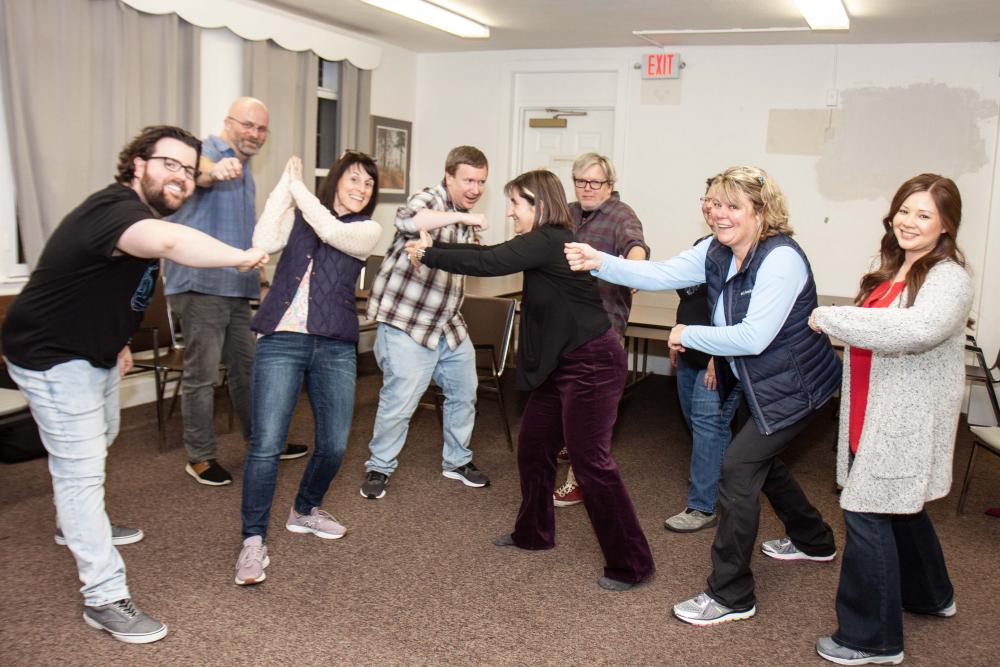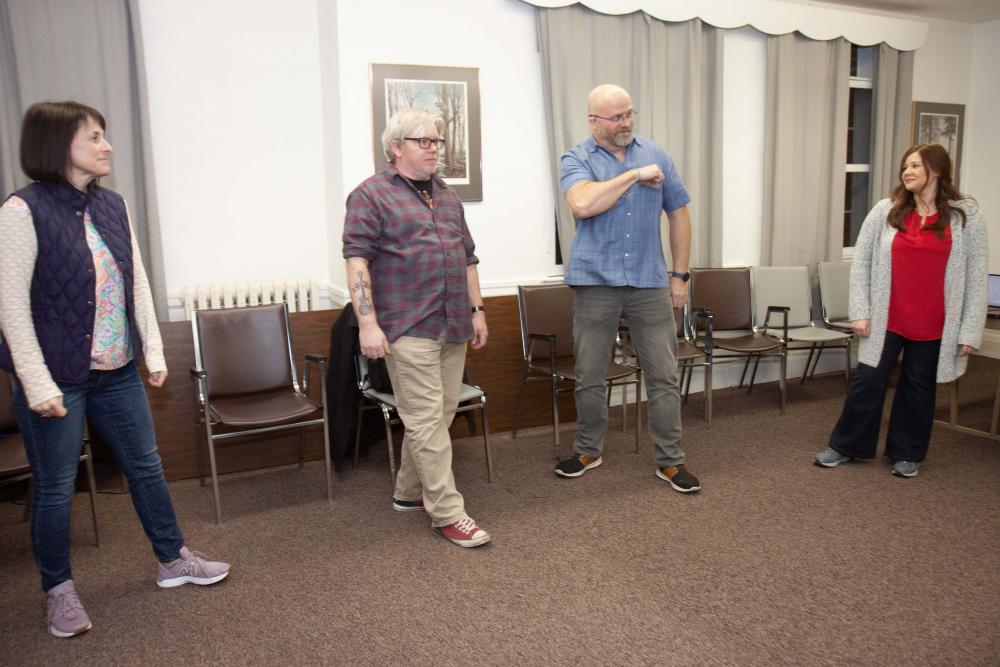The first thing you’ll probably notice about the class is the laughter. There is a lot of it, and it’s coming from perfectly ordinary looking adults of various ages. Secondly, they appear to be playing a variety of games. Speak to them, and you’ll hear frequent mention of ‘Yes-And.’ You may even catch an exchange where each person taps the other on their back saying, ‘Got your back.’
Welcome to Improv 101.
 Led by Dan Brown, owner of Reflex Improv, the two-hour six-week course held at the Waterfowl Building in Easton, is probably unlike anything you’ve experienced before. As most of the students we spoke to said: it’s kind of transformative.
Led by Dan Brown, owner of Reflex Improv, the two-hour six-week course held at the Waterfowl Building in Easton, is probably unlike anything you’ve experienced before. As most of the students we spoke to said: it’s kind of transformative.
Improvisation, for those unfamiliar with it, is typically a form of comedic theater that is unscripted and created spontaneously by the players involved. “I think most people come into an improv class being intimidated by it,” says Brown. “But really all you need is an open mind. That’s the biggest thing. The actual process of ‘Yes-And-ing’ makes it effortless in a way.”
There it was again: The ‘Yes-And’ mantra.
 Brown explained that it’s one of the essential components in improvisational comedy where you agree with what’s been given to you by a teammate (‘Yes’), regardless of where you wanted it to go, and then add your piece to it (‘And’). After the agreement, the second part is letting your teammate know you support them (‘I’ve got your back’). It follows that when you make them look good, it makes you look good, and creates a successful scene.
Brown explained that it’s one of the essential components in improvisational comedy where you agree with what’s been given to you by a teammate (‘Yes’), regardless of where you wanted it to go, and then add your piece to it (‘And’). After the agreement, the second part is letting your teammate know you support them (‘I’ve got your back’). It follows that when you make them look good, it makes you look good, and creates a successful scene.
This feels reassuring, but what if I’m not sure I’m funny?
“Honestly, the best students I’ve had are the ones that say ‘I’m not funny,'” says Brown. “And then it turns out, yes, you are. You just have to try it. The funny comes out on its own. The best way to describe it is if you just agree and respond, agree and respond, funny walks by you, and then you pounce on it without actively trying to be funny.”
Effortless comedy. Sounds intriguing.
It also sounds impossible. But Brown believes that everyone can learn improv skills. He would be an excellent judge of that conviction, having worked as a teacher for the past seven years. Improv classes in college led Brown to take workshops with Washington Improv, which led to teaching for them and eventually opening up his school.
 Reflex holds classes at various locations in Northern Virginia, Annapolis, and now in Easton. “That’s my number one goal,” says Brown. “I want to take improv to places that don’t have easy access to it. My other goal is to create an inclusive environment where everybody feels welcome regardless of their background or their skills.” Or their age. Brown said his students have ranged from 18 through 86.
Reflex holds classes at various locations in Northern Virginia, Annapolis, and now in Easton. “That’s my number one goal,” says Brown. “I want to take improv to places that don’t have easy access to it. My other goal is to create an inclusive environment where everybody feels welcome regardless of their background or their skills.” Or their age. Brown said his students have ranged from 18 through 86.
Some of the Easton group consist of people who first learned about improv through an introductory session Brown held at Shore Leadership. Others heard about it from friends. About half of the class did a six-session course last fall. The rest are newcomers. Although most described the class as being outside their comfort zone, all agreed that it was a lot of fun.
This does not surprise Brown. “The people who attend include those who have boring day jobs and want to try to do something fun at night. People who want to meet new people. People seeking out a community. People who just want to laugh for a couple of hours. Some of the best friends I’ve had, I’ve met through improv classes.”
We wanted to know and asked the students: Does the creativity of improv comedy translate to everyday life?
Nancy Andrew, former Executive Director of Habitat for Humanity Choptank, currently working on her masters, is one of the inaugural members of the group. “My first classes with Dan were in Annapolis. I was thrilled that he was willing to come to the Shore to try and getting something going on this side of the Bay. For me, improv is a fun challenge. I have so much to learn. I’m motivated to keep working on the skills and love the side-splitting laughter along the way!”
Heather Hall is a beginner. “My job as a Life/Executive Coach, and Spiritual Director, is being a professional listener, and improv is all about listening. Taking these classes is helping me become a better listener.”
For Jeremy Hillyard, this is his second improv class. Hillyard, a Spanish teacher at Easton High School, uses what he’s learned and applies them to his classes. “So much about speaking a second language is communication and spontaneity in situations. By using strategies learned in improv class, I was able to provide another pathway for students to express themselves while also improving their ‘thinking in Spanish’ skills for both academic and conversational situations.”
An Employee Benefits Account Executive with Avon-Dixon Insurance Agency, Tania Chen, first heard about improv when a family member was taking a workshop as part of his Executive MBA curriculum. What she’s learned through the class is this: “There are no mistakes, and you don’t need to prepare anything in advance of each class. You simply need to be present and react to what you are seeing and hearing. Learning the basics has been a great tool in both my personal and professional development.”
“I have absolutely seen how the principles we are learning can be applied to other aspects of my life,” says Dan Van Skiver, a plumbing/HVAC wholesaler, “so it’s a win-win. I get to have fun making people laugh, and I get some new tools in my social toolbox,”.
Margaret Enloe, Executive Director of Waterfowl Chesapeake, utilizes the principles in her workplace. “I knew the concept of Yes-And, and have tried to use it at work, but have never seen it implemented in this way where you’re consciously supporting whatever the other person says. I learned that it’s OK to make mistakes, and that’s what’s fun about the class, you actually get to laugh about your mistakes.”
Marine biologist Howard Townsend also sees the benefit: “Improv is all about agreement. Moving into an “agreement space” and seeing what ideas develop. I want to move people to an agreement space for my work and open up our thinking and responsiveness. Improv exercises help me learn techniques to do this.”
“For most of my professional life, I was a rule writer and enforcer,” says Spiritual Director/ Retreat Leader and Writer, Linda Mastro. “Dan Brown helped me see that within the few and important rules of improv, there is lots of room for spontaneity and fun to happen. I am getting much more comfortable stepping into new situations without worrying about if I know enough and wondering how I can control the outcome.”
Besides the personal benefits, the main principles of improv can also apply to groups in a workplace environment, and Brown has workshops for organizations, as well. His philosophy? The best way to get people to work together is to get them to play together first. “We joke that it’s cheaper than therapy. When you’re laughing and you’re interacting with people, you can also act out things that you can’t do in real life, such as yell at an improv boss. When we get people that are serious all the time, in a room where they’re laughing for two hours instead, it changes the dynamic of things. People know each other better.”
It seems to all come down to a shift in focus.
Anne Marie Altvater, the owner of Campbells Lane Farm, sums up why she’s on her second round of improv classes: “What I like are the three principles of improv: 1. Say ‘Yes-And’ to everything. 2. Remember, ‘I got your back.’ 3. Make everyone else look good. If we all lived by these three things alone, think how much better the world would be!”
Curious? Try an intro session on March 17.
Don’t miss the latest! You can subscribe to The Talbot Spy‘s free Daily Intelligence Report here
Val Cavalheri is a recent transplant to the Eastern Shore, having lived in Northern Virginia for the past 20 years. She’s been a writer, editor and professional photographer for various publications, including the Washington Post.



Write a Letter to the Editor on this Article
We encourage readers to offer their point of view on this article by submitting the following form. Editing is sometimes necessary and is done at the discretion of the editorial staff.